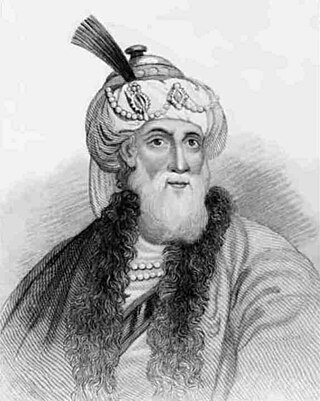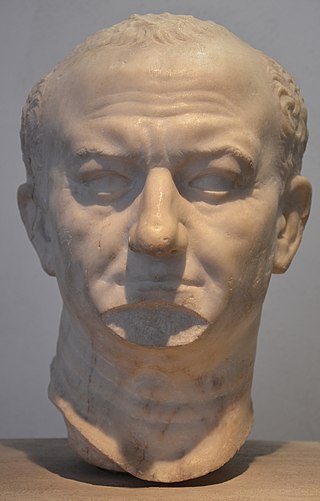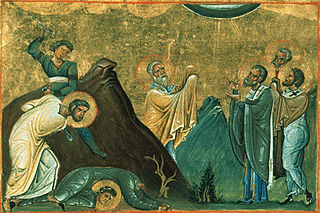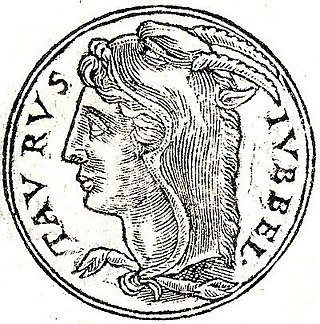Related Research Articles

Flavius Josephus was a Roman–Jewish historian and military leader. Best known for writing The Jewish War, he was born in Jerusalem—then part of the Roman province of Judea—to a father of priestly descent and a mother who claimed royal ancestry.

Valentinian I, sometimes called Valentinian the Great, was Roman emperor from 364 to 375. He ruled the Western half of the empire, while his brother Valens ruled the East. During his reign, he fought successfully against the Alamanni, Quadi, and Sarmatians, strengthening the border fortifications and conducting campaigns across the Rhine and Danube. His general Theodosius defeated a revolt in Africa and the Great Conspiracy, a coordinated assault on Roman Britain by Picts, Scoti, and Saxons. Valentinian founded the Valentinianic dynasty, with his sons Gratian and Valentinian II succeeding him in the western half of the empire.
An ostiarius, a Latin word sometimes anglicized as ostiary but often literally translated as porter or doorman, originally was a servant or guard posted at the entrance of a building. See also gatekeeper.
Helenius Acron was a Roman commentator and grammarian, probably of the 3rd century AD, but whose precise date is not known.

Late Latin is the scholarly name for the form of Literary Latin of late antiquity. English dictionary definitions of Late Latin date this period from the 3rd to the 6th centuries CE, and continuing into the 7th century in the Iberian Peninsula. This somewhat ambiguously defined version of Latin was used between the eras of Classical Latin and Medieval Latin. Scholars do not agree exactly when Classical Latin should end or Medieval Latin should begin.

Flavio Biondo was an Italian Renaissance humanist historian. He was one of the first historians to use a three-period division of history and is known as one of the first archaeologists. Born in the capital city of Forlì, in the Romagna region, Flavio was well schooled from an early age, studying under Ballistario of Cremona. During a brief stay in Milan, he discovered and transcribed the unique manuscript of Cicero's dialogue Brutus. He moved to Rome in 1433 where he began work on his writing career; he was appointed secretary to the Cancelleria under Eugene IV in 1444 and accompanied Eugene in his exile in Ferrara and Florence. After his patron's death, Flavio was employed by his papal successors, Nicholas V, Callixtus III and the humanist Pius II.
Publius Pomponius Secundus was a distinguished statesman and poet in the reigns of Tiberius, Caligula, and Claudius. He was suffect consul for the nundinium of January to June 44, succeeding the ordinary consul Gaius Sallustius Crispus Passienus and as the colleague of the other ordinary consul, Titus Statilius Taurus. Publius was on intimate terms with the elder Pliny, who wrote a biography of him, now lost.

The gens Flavia was a plebeian family at ancient Rome. Its members are first mentioned during the last three centuries of the Republic. The first of the Flavii to achieve prominence was Marcus Flavius, tribune of the plebs in 327 and 323 BC; however, no Flavius attained the consulship until Gaius Flavius Fimbria in 104 BC. The gens became illustrious during the first century AD, when the family of the Flavii Sabini claimed the imperial dignity.
Titus Flavius T. f. T. n. Clemens was a Roman politician and cousin of the emperor Domitian, with whom he served as consul from January to April in AD 95. Shortly after leaving the consulship, Clemens was executed, allegedly for atheism, although the exact circumstances remain unclear. Over time, he came to be regarded as an early Christian martyr.
Pitane, near Çandarlı, Turkey, was an ancient Greek town of the ancient region of Aeolis, in Asia Minor. It was situated near the mouth of the river Evenus on the bay of Elaea. It was one of the eleven ancient Aeolian settlements and possessed considerable commercial advantages in having two harbours. It was the birthplace of the academic philosopher Arcesilaus, and in the reign of Titus it suffered severely from an earthquake. The town is still mentioned by Hierocles. Pliny the Elder mentions in its vicinity a river Canaius, which is not noticed by any other writer; but it may possibly be the river Pitanes, spoken of by Ptolemy, and which seems to derive its name from the town of Pitane.

Olympas was a Roman Christian whom Paul of Tarsus saluted in around 65 AD.
Flavius Mithridates was an Italian Jewish humanist scholar, who flourished at Rome in the second half of the 15th century. He is said to be from Sicily, and was a Christian convert, known for preaching impressively if tendentiously. He also had a knowledge of Arabic.

The praetorian prefecture of the East, or of the Orient was one of four large praetorian prefectures into which the Late Roman Empire was divided. As it comprised the larger part of the Eastern Roman Empire, and its seat was at Constantinople, the praetorian prefect was the second most powerful man in the East, after the Emperor, in essence serving as his first minister.

Sosipater is a person mentioned in the New Testament, in Romans 16:21. He is probably the same person as Sopater mentioned in Acts 20:4.

According to the New Testament book of Romans, Tertius of Iconium acted as an amanuensis for Paul the Apostle, writing down his Epistle to the Romans.
Jabalah IV ibn al-Ḥārith, known also by the tecnonymic Abū Shammar, in Greek sources found as Gabalas (Γαβαλᾶς), was a ruler of the Ghassanids. At first an enemy of the Eastern Roman Empire, he raided Palestine but was defeated, becoming a Byzantine vassal in 502 until circa 520, and again in 527 until his death a year later.
Flavius Merobaudes was a Roman army officer of Frankish origin. He was appointed magister peditum around 375, and consul twice in 377 and 383. Ancient sources record that he was put to death that year for his support of the imperial usurper Magnus Maximus, but an inscription records that he became consul a third time in 388.
The gens Velia was a minor plebeian family at ancient Rome. Members of this gens are first mentioned in the latter part of the first century AD. The first of the Velii to obtain the consulship was Decimus Velius Fidus in AD 144.

The gens Statilia was a plebeian family of Lucanian origin at ancient Rome. Members of this gens are first mentioned in the third century BC, when one of them led the Lucanian assault on the city of Thurii, and another commanded an allied cavalry troop during the Second Punic War; but at Rome the Statilii first come to attention in the time of Cicero, at which point they held equestrian rank. The first of the family to attain the consulship was Titus Statilius Taurus in 37 BC, and his descendants continued to fill the highest offices of the Roman state until the time of Marcus Aurelius.
References
- 1 2 3 One or more of the preceding sentences incorporates text from a publication now in the public domain : Chisholm, Hugh, ed. (1911). "Charisius, Flavius Sosipater". Encyclopædia Britannica . Vol. 5 (11th ed.). Cambridge University Press. p. 860.
- Article by G. Gotz in Pauly-Wissowa, III. 2 (1899)
- Teuffel, Wilhelm Sigismund and Schwabe, Ludwig von, History of Roman Literature (Engl. trans), Vol. I. 2
- Frohde, in Jahr. f. Philol., 18 Suppl. (1892), 567–672